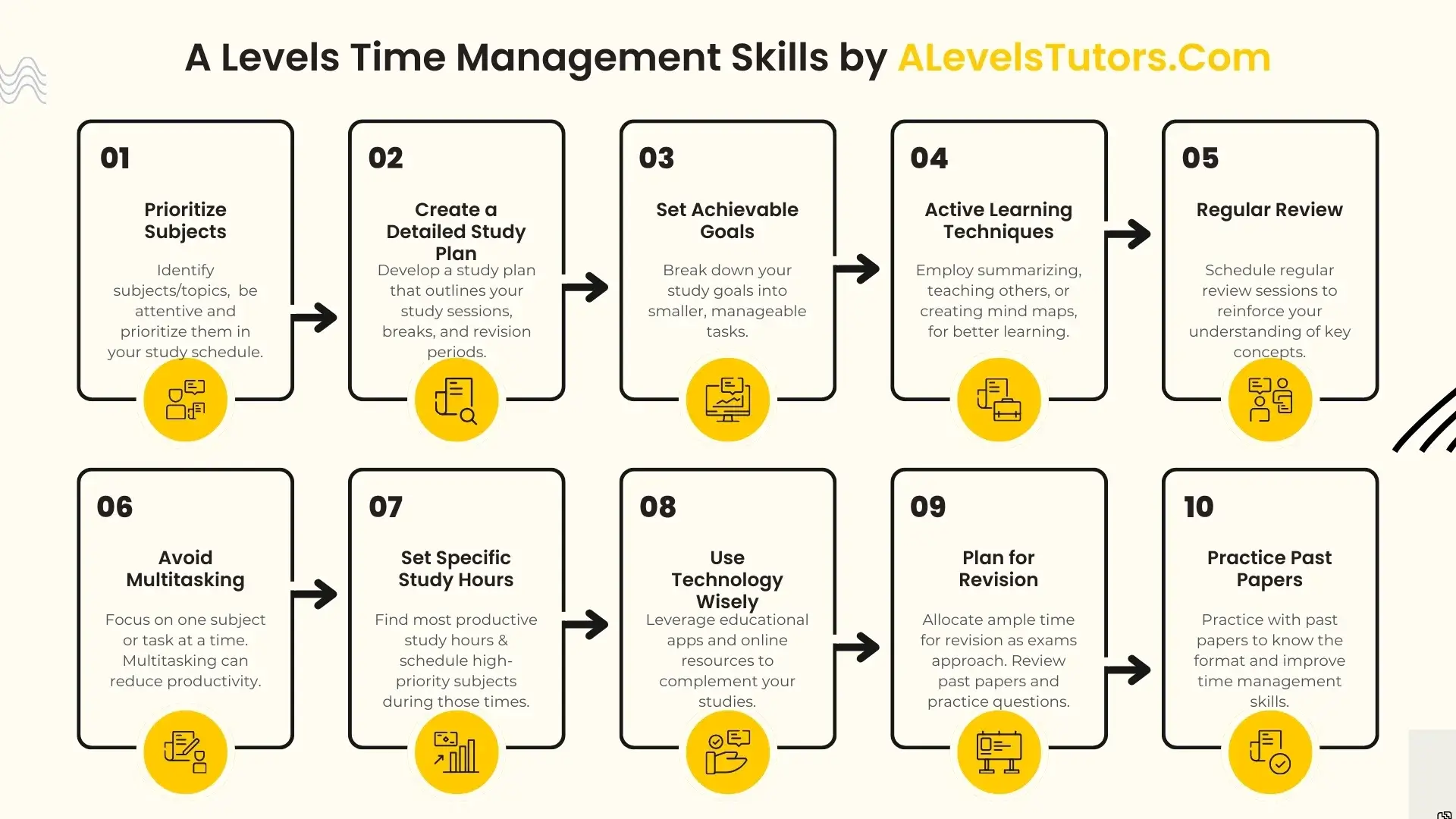
Time Management Skills for A Levels
Effective time management is crucial for A Levels, as it involves balancing multiple subjects and preparing for challenging exams. Here are specific time management skills tailored to A Levels:

1. Prioritize Subjects: Identify which A Levels subjects or topics require more attention and prioritize them in your study schedule. Allocate more time to subjects you find difficult or have upcoming exams for.
2. Create a Detailed Study Plan: Develop a comprehensive study plan that outlines your study sessions, breaks, and revision periods. Be specific about what you will cover during each session.
3. Set Achievable Goals: Break down your study goals into smaller, manageable tasks. Set realistic daily and weekly goals to track your progress.
4. Use a Calendar or Planner: Utilize a physical calendar, digital planner, or study app to organize your study schedule, track deadlines, and set reminders.
5. Time Blocking: Implement time-blocking techniques to allocate specific time slots for each subject or task. Dedicate focused study periods without distractions.
6. Active Learning Techniques: Employ active learning methods, such as summarizing, teaching others, or creating mind maps, to make your study sessions more effective.
7. Regular Review: Schedule regular review sessions to reinforce your understanding of key concepts and avoid last-minute cramming.
8. Breaks: Incorporate short breaks into your study routine. The Pomodoro Technique, which involves 25 minutes of focused study followed by a 5-minute break, can be effective.
9. Avoid Multitasking: Focus on one subject or task at a time. Multitasking can reduce productivity and hinder comprehension.
10. Eliminate Distractions: Identify common distractions (e.g., social media, noise) and create a distraction-free study environment. Consider using website blockers or apps to stay focused.
11. Set Specific Study Hours: Determine your most productive study hours and schedule difficult or high-priority subjects during those times.
12. Balance Subjects: Maintain a balanced study routine by alternating between subjects. This helps prevent burnout and keeps your study sessions fresh.
13. Use Technology Wisely: Leverage educational apps and online resources to complement your studies. However, limit recreational screen time to avoid distractions.
14. Plan for Revision: Allocate ample time for revision as exams approach. Review past papers and practice questions to test your knowledge.
15. Seek Support: Don’t hesitate to reach out to teachers, tutors, or classmates if you need help understanding difficult concepts. Collaborative learning can be beneficial.
16. Flexibility: Be adaptable and open to adjusting your study plan when unexpected events arise. Flexibility is essential for managing stress.
17. Self-Care: Prioritize your well-being by getting enough sleep, maintaining a balanced diet, exercising regularly, and practicing relaxation techniques.
18. Reflect and Adjust: Regularly evaluate your time management strategies and make adjustments based on your progress and evolving needs.
19. Practice Past Papers: As exams approach, practice with past A Levels papers to become familiar with the format and improve your time management during the actual exam.
20. Stay Positive: Maintain a positive attitude and believe in your ability to succeed. Confidence in your skills can boost your productivity and overall time management.
A Levels time management skills can significantly impact your A Levels performance, for every board from CAIE and Edexcel to AQA and OCR. By implementing these strategies and staying disciplined, you can optimize your study routine and reduce stress during this critical period of your education.
Find A Levels Tutors
Find A Levels home tutors in Lahore, Karachi, Islamabad, and Rawalpindi, Pakistan; and online tutors anywhere globally be it London, Dubai, Jeddah, Singapore, Kuwait, Cairo, Bangkok, Birmingham, Abu Dhabi, Doha, Muscat, or any other destination. If you need a quick revision, and help with your past papers for Maths, Chemistry, Biology, Physics, Accounting, English, Sociology, Psychology, Computer Science, or any other subject of Cambridge, AQA, Edexcel, and OCR board for AS, A2, or composite exam.


